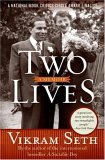Summary | Excerpt | Reading Guide | Reviews | Beyond the Book | Readalikes | Genres & Themes | Author Bio

1.3
Now, at the age of seventeen, I was once again in Shanti Uncle
and
Aunty Henny's home, reacquainting myself with them and with my
surroundings.
18 Queens Road was a large semidetached house about five
minutes walk from the Hendon Central underground station on
the Northern Line, a couple of stations after it emerged from
its
tunnel into the daylight. Apart from two small attics, the house
was
spread over two floors. Each floor had four main rooms.
Downstairs, the sunniest room, with a large south-facing window,
was Uncle's surgery. He spent more than eight hours there each
day, and needed the light. The surgery faced the front garden
with
its roses and gleaming professional plaque, and, beyond the busy
road, the green expanse of Hendon Park and the hills of
Hampstead to the south.
Across the corridor, which acted as a sort of waiting-room for
the patients, was the drawing-room. This was divided from the
small dining-room by a sliding glass door, which was left open
whenever there was a party. The dining-room led to the large
linoleum-floored kitchen, Aunty Henny's sacred space; and that
gave on to the long, narrow back garden where a couple of
gnarled
apple trees produced malformed but deliciously tart fruit.
A flight of stairs led up from the L-shaped corridor. Upstairs,
above the kitchen was the so-called X-ray room, still used
occasionally for developing X-rays, but now mainly a storage
space
for everything from dental gold to yellowing newspapers to
dozens
of bottles of Schweppes tonic water. Shanti Uncle was something
of
a pack-rat. There was also an upstairs drawing-room directly
above the surgery which, though filled with sunlight, was, for
some
reason, almost never used. Its main ornament was a huge,
colourful
porcelain cockatoo. The other two rooms were Uncle and
Aunty's bedroom and a guest bedroom. Everywhere there was a
profusion of net curtains. The only toilet and the only bathroom
in
the house were on this upstairs floor.
Up a flight of narrow stairs, directly under the slanted roof,
were the two attics, each with a small window. One of these
attics
was to be renovated for me, so that I could have a room of my
own
and privacy for study. It was, however, directly above Shanti
Uncle
and Aunty Henny's bedroom, and occasionally at night I would
hear them talking or quarrelling in German.
My room had not yet been done up, so I stayed in the guest
bedroom.
I was there for only a few days in the first instance, because
term at Tonbridge School was about to begin.
I had won a scholarship to study for my A-levels at Tonbridge
on the basis of my final exams at Doon, my boarding-school in
India. But my mother was not at all keen that I go to England on
my own: sex, drugs and general dissipation were what she feared.
My father, however, prevailed; he told her that if she prevented
me
from going, I would hold it against her all my life. Perhaps it
was
to preserve me from the temptations of English ways that Mama
took me to the temple. The other preservative would be Shanti
Uncle. He would keep a watchful eye on me, report back to them,
and act, in general,
in loco parentis. Had he not
been in England,
I doubt Mama would have let me go; and Papa was right – I doubt
I would have forgiven her.
Visit HarperCollins.com for more information about Two Lives by Vikram Seth. The foregoing is excerpted from Two Lives by Vikram Seth. All rights reserved. No part of this book may be used or reproduced without written permission from HarperCollins Publishers, 10 East 53rd Street, New York, NY 10022.
Your guide toexceptional books
BookBrowse seeks out and recommends the best in contemporary fiction and nonfiction—books that not only engage and entertain but also deepen our understanding of ourselves and the world around us.